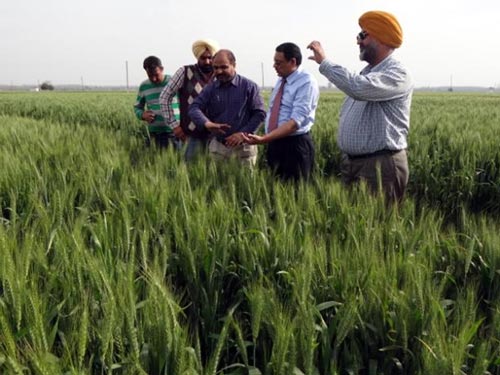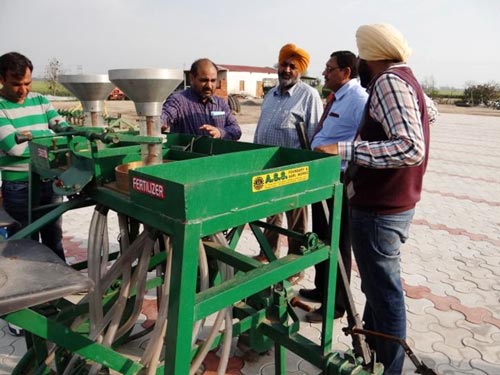By Pankaj Singh, H.S. Sidhu and Parvinder Singh/CIMMYT
It was a memorable day for Borlaug Institute for South Asia (BISA) staff when Alok Sikka, deputy director general of natural resource management for the Indian Council of Agricultural Research, visited the BISA research station at Ludhiana.

H.S. Sidhu, senior research engineer, and Pankaj Singh, BISA farm manager, welcomed Sikka and described farm development activities. The guests visited the genomic selection trial, a five-year project started in November 2013 that is funded by USAID-Feed the Future, Cornell University and Kansas State University. CIMMYT’s Ravi Valluru described efforts to rapidly develop climate-resilient wheat varieties for South Asia using genomic selection. Through this approach, researchers can predict the best wheat lines, even at the early seedling stages.
The early prediction of important traits and wheat lines can be used to accelerate breeding, leading to the rapid identification and release of high-yielding, heat-tolerant candidate wheat varieties for South Asia with annual genetic gains superior to those obtained through conventional breeding. Later, the visitors saw international nurseries, wheat hybrid trials and the long term conservation agriculture (CA) trial being conducted on the farm. M.L. Jat emphasized that depleted freshwater resources due to rising demand from an increasing population is a serious concern. There is a need for alternative cropping systems with high yields, low irrigation water requirements and high water productivity compared to rice-wheat systems.

Sidhu pointed out that relay cropping of wheat in standing cotton is beneficial for farmers. Some progressive farmers are ready to start the relay cropping of wheat in standing cotton, after visiting the long-term CA trial. Jat and Parvinder Singh described trials started in 2013 to test different cultivars with different establishment environments and in different ecologies.
The same trial is being conducted at the three BISA farms, located in different ecologies with six common and four regional varieties. Early results show the need to focus on site-specific recommendations, instead of blanket recommendations for an entire region. Sidhu and Jat described the objectives of the precision water management trial supported by the Cereal Systems Initiative for South Asia project (CSISA) that started in spring 2013. The trials showed impressive results and continued with a maize-maize-pea rotation. Jat said farmers are interested in spring maize due to its high yield potential, but the crop requires more water.
Technology is needed to save water while retaining yields. Finally, Sidhu described second generation CA machinery and emphasized that it can be useful for small landholders.
 Capacity development
Capacity development 
